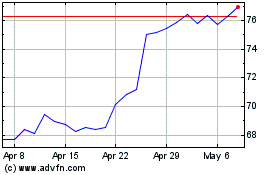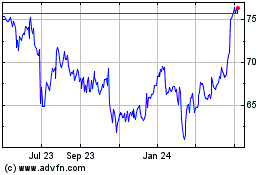By Yuka Hayashi, Sabrina Siddiqui and Andrew Restuccia
WASHINGTON -- The Biden administration moved to sharply ramp up
Covid-19 vaccine exports to other countries, following calls for
the U.S. to bolster efforts to curb the coronavirus globally as it
rages unchecked in developing nations.
The U.S. plans to share 20 million doses of vaccines produced by
Moderna Inc., Pfizer Inc. and Johnson & Johnson, the White
House said. That is on top of 60 million doses of the AstraZeneca
vaccine previously promised for export, though it hasn't yet been
authorized for use in the U.S.
President Biden said on Monday that 80 million vaccine doses are
expected to be exported by the end of June. Delivery of the
AstraZeneca vaccine doses will be dependent on a review by the Food
and Drug Administration, the White House said.
"We know America can never be fully safe until the pandemic
that's raging globally is under control," Mr. Biden said.
The U.S. has faced criticism both at home and abroad for
policies that prioritized the vaccination of Americans, in part
through contracts that required vaccine manufacturers to deliver
most of their initial production to the U.S. government.
The U.S. as of last week had produced more than 333 million
doses of vaccine and exported about three million doses, far less
than other major vaccine-producing nations, according to data from
Airfinity, a London research firm.
By comparison, China has shipped 252 million doses overseas, or
42% of its total production, while the European Union has exported
111 million doses, more than one-third of its total output. Russia
has exported 27 million doses.
In his remarks Monday, Mr. Biden said that the 80 million doses
would be far more than any other nation has donated to date,
drawing a distinction with vaccines that were sold by other
countries.
The low U.S. export numbers reflect a policy aimed at
vaccinating Americans first, but now called into question as
domestic inoculations rise and demand wanes.
The U.S. had vaccinated 48% of its population at least partially
as of Sunday, compared with 32% for the EU and 9.8% for Russia,
according to Our World in Data. China has administered 407 million
vaccines domestically, inoculating roughly 30% of its population.
Beijing has pledged to donate 17.6 million doses to 65
countries.
Tom Bollyky, director of the global health program at the
Council on Foreign Relations, said it was understandable for
advanced nations to prioritize their own high-risk citizens, but
the equation changes as vaccinations of that population nears
completion.
Demand for vaccines declined in the U.S. in recent weeks after
the number of daily doses administered reached a mid-April peak of
3.38 million. An average of 1.9 million doses were given each day
over the past week, according to the Centers for Disease Control
and Prevention.
"There is a need for the United States to continue showing the
urgency," Rep. Earl Blumenauer (D., Ore.) said. "I'm hopeful the
administration is going to be putting on a full-court press to
involve others in this challenge -- the industry and other rich
countries all have a role to play."
In his remarks Monday, Mr. Biden said that Covid-19 cases had
declined in all 50 states for the first time since the beginning of
the pandemic.
Jeff Zients, the White House Covid-19 coordinator, will lead the
administration's global vaccination efforts. Gayle Smith, a State
Department official who is coordinating the U.S. role in the global
coronavirus response, will also be a key part of the effort, Mr.
Biden said.
The administration has also committed a combined four million
AstraZeneca doses to Canada and Mexico.
Pressure on the U.S. to export more grew after Washington
expressed its support for a World Trade Organization proposal to
temporarily waive intellectual property rights for vaccines to
speed up global production -- an idea opposed by European allies
and pharmaceutical companies.
"I call very clearly on the U.S. to end the ban on exports of
vaccines and on components of vaccines that prevent their
production," French President Emmanuel Macron said on May 8.
Adar Poonawalla, chief executive of Serum Institute of India, a
major manufacturers of AstraZeneca vaccines, took to twitter last
month, asking Mr. Biden to "lift the embargo of raw material
exports out of the U.S. so vaccine production can ramp up."
In a May 3 letter to Mr. Biden, Michelle McMurry-Heath, head of
Biotechnology Innovation Organization, a trade group, asked the
government to allow companies to export vaccines from U.S.
manufacturing facilities so they could rush doses to Covax and
other countries.
U.S. officials have said that there was no outright ban on
exports, but that domestic distribution was given priority under
the Operation Warp Speed strategy implemented by the Trump
administration and continued under the Biden White House.
Under that program, the U.S. government preordered hundreds of
millions of vaccines from companies like Pfizer and Moderna even
before their vaccines were authorized, which obligated the
companies to fulfill those contractual volumes first.
The U.S. has also used the Defense Production Act to limit
exports of vaccine ingredients and related equipment like vials and
syringes needed to distribute and administer the vaccines. The
Biden administration has employed the Korean War-era national
security mobilization measure to give domestic vaccine makers the
priority to receive U.S.-made components needed for manufacture. In
return, the vaccine makers prioritize U.S. supply.
"DPA is just a prioritization of U.S. government contracts for
U.S.-based manufacturing, and that's the extent of that," said Tim
Manning, the supply coordinator for the White House Covid-19
Response Team. "There is just vastly more manufacturing and
ordering of these consumables going on than the companies can
supply."
Write to Sabrina Siddiqui at Sabrina.Siddiqui@wsj.com and Andrew
Restuccia at andrew.restuccia@wsj.com
(END) Dow Jones Newswires
May 17, 2021 15:53 ET (19:53 GMT)
Copyright (c) 2021 Dow Jones & Company, Inc.
AstraZeneca (NASDAQ:AZN)
Historical Stock Chart
From Mar 2024 to Apr 2024

AstraZeneca (NASDAQ:AZN)
Historical Stock Chart
From Apr 2023 to Apr 2024
